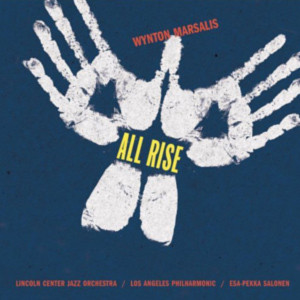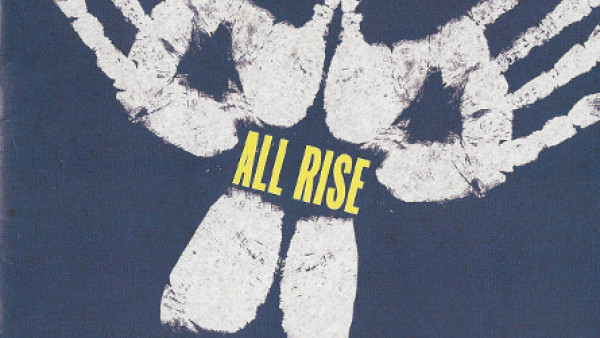Marsalis’ Epic “All Rise” Reaches High
NEW YORK — It isn’t often that the combined forces of a symphony orchestra, large jazz ensemble and 60-voice choir share a stage.
But considering the stylistic range and expressive breadth of the music at hand, perhaps the sheer number of musicians jammed into Avery Fisher Hall at Lincoln Center should not have been surprising.
The occasion was last week’s world premiere of Wynton Marsalis’ “All Rise,” an epic blues suite that embraces ancient African chant, New Orleans parade music, 20th Century symphonic modernism, rural Southern dance forms and much more.
The New York Philharmonic commissioned Marsalis to write the work, his first original composition on a symphonic scale. Characteristically, Marsalis reached high, scoring “All Rise” for the Philharmonic, plus jazz band and choir.
But that multi-faceted approach had an unintended consequence: It showed that Marsalis’ writing for jazz and choral ensembles was considerably more eloquent and refined than his writing for the symphony orchestra. Though there’s no question that Marsalis has penned several sublime passages for the N.Y. Philharmonic in “All Rise,” it is his swing-based, blues-driven sections for the Lincoln Center Jazz Orchestra and accompanying choir that distinguishes him as a composer — at least at this point in his musical development.
It opens ingeniously, with the low male voices of the choir producing rumbling sonic effects suggesting the didgeridoo, an Australian aborigine wind instrument. By reaching into such exotica, then exploring modern Western idioms and genres, Marsalis clearly is addressing the sweep of human musical expression.
That’s quite an undertaking, but Marsalis brings together disparate musical styles by infusing every movement of “All Rise” with elements of the blues. Whether he’s exploring samba rhythms, slow-drag dances or Stravinsky-like dissonance, Marsalis finds plangent blues melody at their core. This is what makes “All Rise” cohere, even though its 12 movements span entire continents and musical cultures.
In an evening-length work, the most stunning moments come at the beginning and the end. After the call to antiquity that opens the piece, for instance, Marsalis segues into the brisk, repeated snippets of melody that one associates with Minimalist composers such as Philip Glass. But Marsalis’ piquant chords and edgy syncopations prove far more interesting to follow than standard Minimalist fare.
Moreover, by moving seamlessly from the sounds of ancient Africa to the rhythms of late 20th Century America, Marsalis says a great deal about the links between music of past and present.
The last four movements of “All Rise” also are exceptionally effective, whether Marsalis is exploring the intersection of Latin rhythm and African-American blues in the “El `Gran’ Baile de la Reina” movement or evoking the universally recognizable sound of a train chugging along the tracks in “Expressbrown Local.”
The sweetly unaffected melodicism of the “Saturday Night Slow Drag” movement and the deeply spiritual vocal lines of the finale, “I Am (Don’t You Run from Me),” also represent Marsalis’ writing at its most evocative. The thunderous choral passages, which suggest a jazzy reinvention of “Carmina Burana,” and the New Orleans parade finale underscore the vividly pictorial nature of this score.
If movements such as “Wild Strumming of Fiddle” (with its overly repetitive string patterns) and “The Halls of Erudition and Scholarship” (with generic orchestral scoring) slow the progress of the piece, that problem could be fixed easily enough. A little trimming of the less effective symphonic passages would tighten “All Rise” considerably.
One suspects, however, that after Wednesday night’s premiere, no one is more keenly aware of the slow spots in the work than Marsalis. It’s not until a composer hears a new piece performed for an audience that its strengths and weaknesses become apparent.
In the end, though, there’s no doubt that Marsalis’ writing is at its most personal persuasive when he’s creating sounds for the Lincoln Center Jazz Orchestra, which he directs, and for the human voice. Traditional symphonic strings and winds, which play an important role in “All Rise,” simply cannot capture the deep-blues sensibility that always has defined Marsalis’ most searing music.
Even so, one has to admire the New York Philharmonic for daring to commission a piece as ambitious and unorthodox as this and conductor Kurt Masur for leading such a fiercely committed performance. In so doing, Masur and the Philharmonic give black music in America a degree of respect it does not typically receive in the concert hall.
– By Howard Reich, Tribune Arts Critic.
Source: Chicago Tribune



